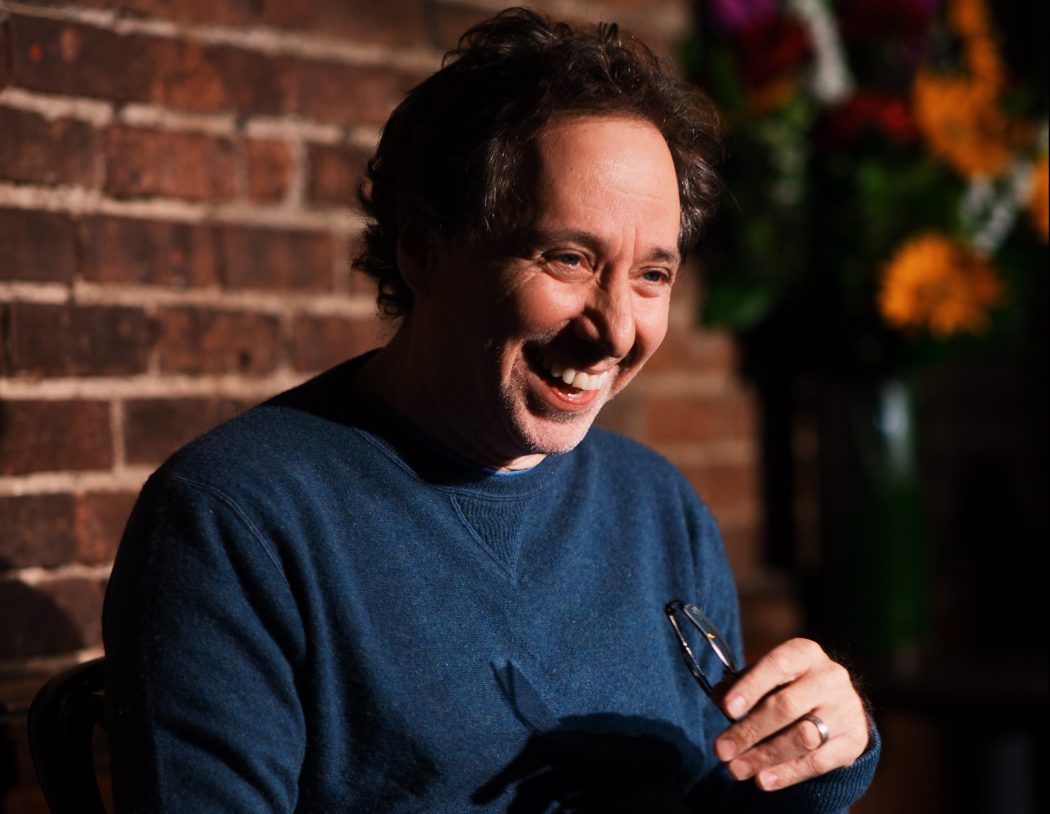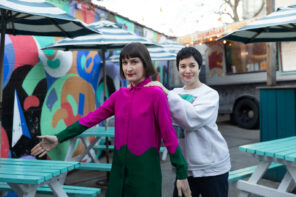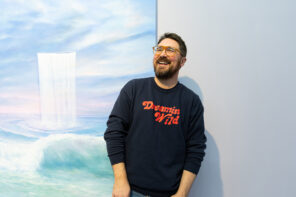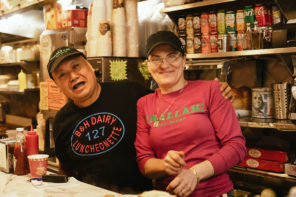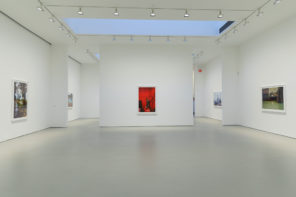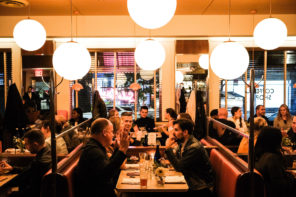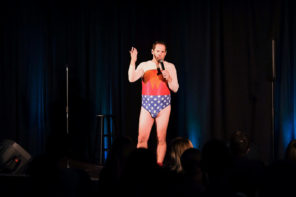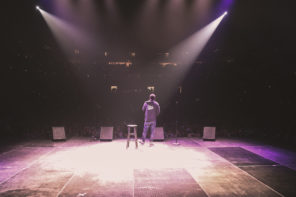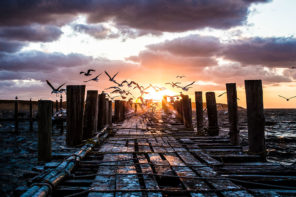The Comedy Cellar has soul. That’s the most important part of it all. There are other details that you probably need to know, such as the address, hours of operation, how to purchase tickets before you arrive, but most importantly, you should know about the community of good that the world’s most iconic comedy club brings together—that’s no joke.
Noam Dworman, owner of The Comedy Cellar, carries relationships with folks who stop by regularly like Dave Chappelle, Jon Stewart, Amy Schumer, Kevin Hart, and some guy named Seinfeld. But truth be told, Noam is less the keeper of great comics and more the eternal steward for warm hospitality, good times, and a damn good Beatles cover, if you’re lucky. Ask any legendary comic, and they’ll tell you The Cellar is the epicenter for a community of talented individuals that choose to do stand-up comedy for a living. More specifically, the epicenter is “the table” that sits unassumingly in the back of Olive Tree Cafe & Bar, a casual bar and restaurant that sits above The Comedy Cellar where many performing that night will hang out before and after a show. On any given night, you will come across a wide swath of comedic greatness, from those who pack out stadiums to the new kids on the block. You would think this flow was all by design, given the landscape of how corporate America has infiltrated Manhattan, but Noam, Estee, and the team who hosts several hundred people a night at the clubs on MacDougal and West 3rd have been hosting comedy shows with a grassroots family vibe since before Starbucks poured its first cup in NYC. You can even catch Noam playing live music himself upstairs every Friday. We had the privilege to sit down with Noam to review things like where to buy tomatoes in NYC, what luck has to do with success, and why Donald Trump Jr. doesn’t think any of this is funny.
The following is an interview between Noam Dworman and Whalebone Magazine.
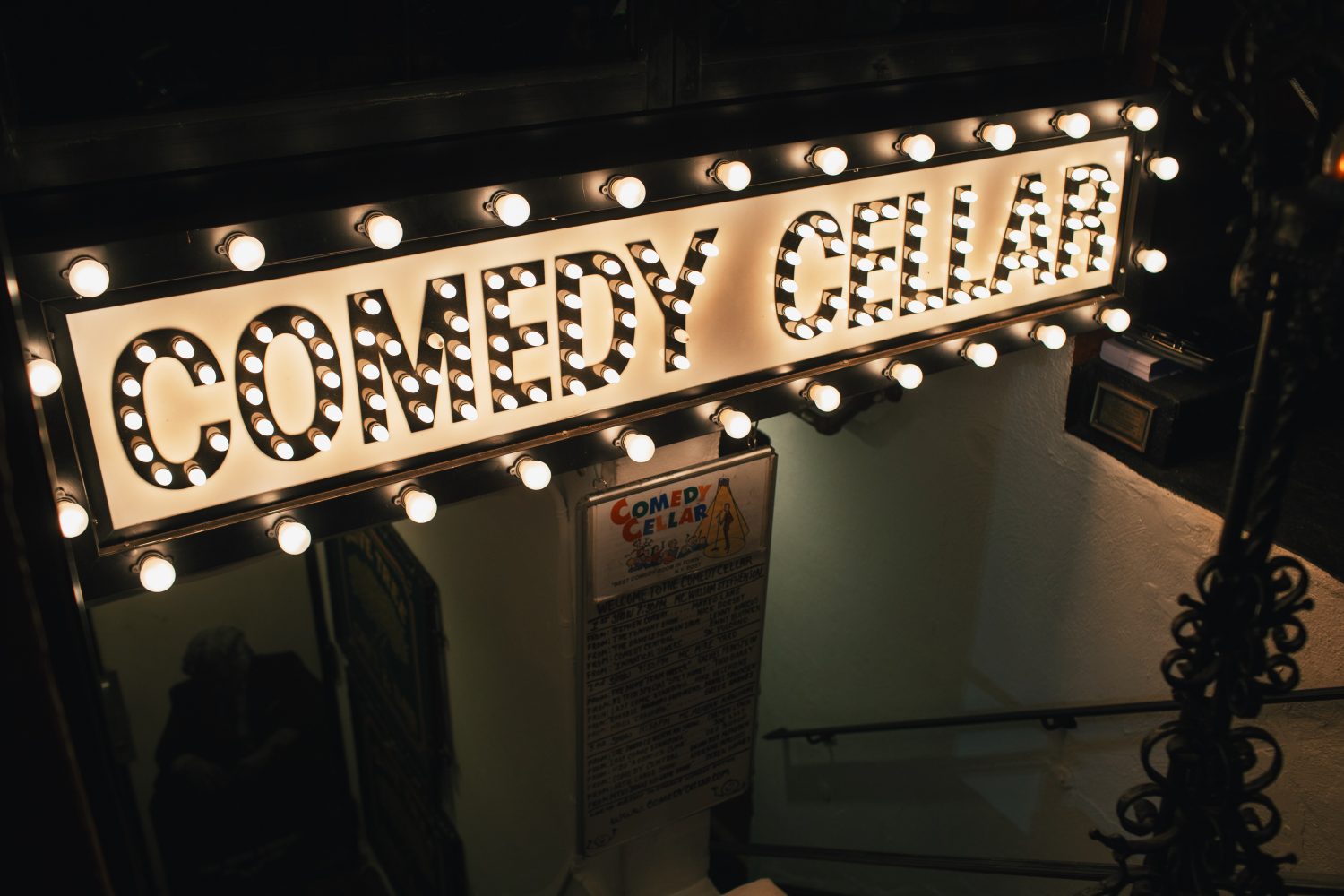
It starts sometime around midnight, at least that would be a better place to start than any other. The Comedy Cellar is located in the heart of Greenwich Village in New York City, and we meet Noam at Olive Tree Cafe & Bar. Noam slides into a booth upstairs from The Comedy Cellar and introduces himself. He says hello to almost everyone as he walks through the room and invites a few others to join us.
What is your relationship with New York?
Noam Dworman: I think all the time about the pure luck of being born in New York. It’s the center of the world. Any possible ambition a human being might have is available to him in New York, and almost any experience can be had within 100 miles. I grew up on 100th Street and Riverside Drive, went to PS 75 on 95th Street, spent every day with my best friend John Engle at Riverside Park. In those days, we walked five blocks to school, alone, in the first grade. We took the city buses by ourselves, too. Most of us were mugged at one time or another. It’s was a different world. The Village, where the Cellar is now, at the height of the folk music boom, was so packed with people and cars, you could barely walk down the street. That’s changed too, the Village is no longer an important neighborhood for American show business.
We all spend more time at the Cellar than we do anywhere else. And also the comedians, as they come up, work together on the road and at clubs all over town. So the closeness that develops is very deep.
How does one find themselves owning one of the best comedy club in the world?
ND: It’s all been a happy accident. When I graduated from law school, I knew very clearly that I didn’t want to practice law. So from 1988 until 2004, when my father died, I spent my time opening music venues. I re-opened the Cafe Wha, which had closed in 1968, and led the house band there for around 20 years. It was a massive success with lines out the door literally seven nights a week. I also opened the Fat Black Pussycat and the Village Underground. When my father died at the end of 2003, his wife (Ava) and I inherited the Comedy Cellar. Around that time, I had only a few years left on my Cafe Wha lease, and the landlord was playing his cards close to his vest. So I decided to sell the Wha, and commit to the Comedy Cellar. I had too much on my plate. A few years later, my Ava retired and I was left alone with the club.
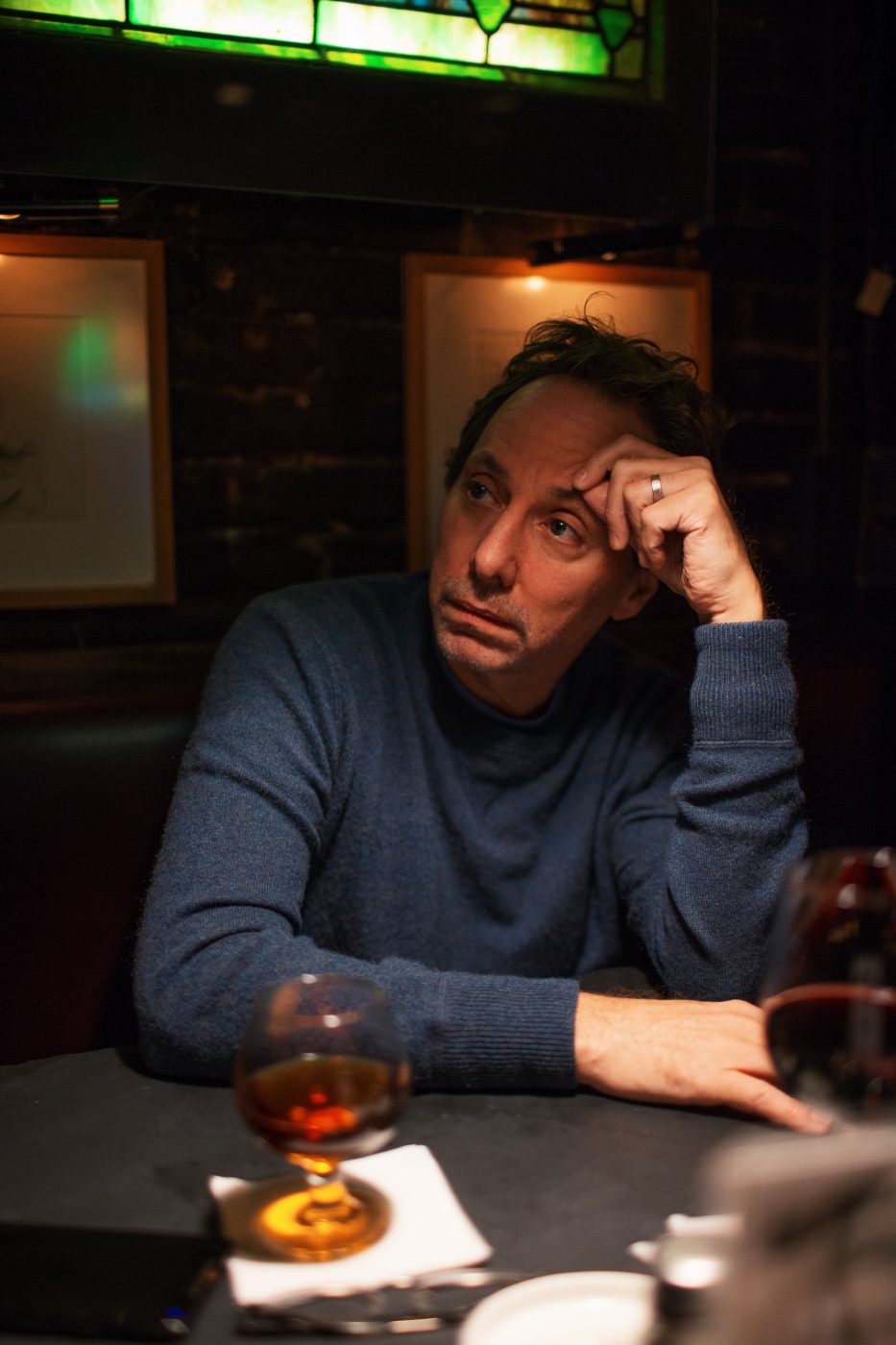
What makes The Comedy Cellar so magnetic for legendary new and older talent?
ND: Part of this is pure luck. The actual physical makeup of the club is just perfect for stand-up comedy. The dimensions, the ceiling height, the brick—even the color of the brick—all of it was not by design. And my father did a wonderful job of overlaying a beautiful atmosphere on top of that. The stained glass and the wood paneling were all his doing, and then the luck of having a restaurant upstairs for the comedians to hang out. And by the way, that location was not so perfect and my father had to do quite a lot of work to make it feel cozy.
All this to say that part of the success of the club came from the fact that it was just a wonderful place to do comedy, and then hang out with your comedian friends. My father was a wonderful host—he got that from my grandmother. And also, having been a working musician most of his life, he was keenly aware of how to treat performers. He was funny, and he always had weed. Over time, as more and more fledgling comics, like Colin Quinn (really the Cellar’s biggest supporter through the years), Jon Stewart, Ray Romano, Chris Rock and the rest took over the world, a legend grew. And then, as the other important clubs closed down—the Improv and Catch a Rising Star (which was a great room), we became kind of the last man standing.
Part of this is pure luck. The actual physical makeup of the club is just perfect for stand-up comedy. The dimensions, the ceiling height, the brick—even the color of the brick—all of it was not by design.
If a newcomer wanted to get a start at Comedy Cellar, how do you suggest they go about getting on your radar?
ND: If you have a Cellar comic that knows you and can recommend you personally, that’s great, but it’s definitely not required. Just email us a video. It’s really that simple. There’s a lot of disinformation out there about how picky we are, etc. But it’s all nonsense. The truth is we’re every bit as hungry for new talent as a comedian is to get on our stage. If you’re really funny and can somehow prove it, we’ll give you a chance. But it’s a very, very competitive environment.
Can you tell us about Estee Adoram?
ND: Estee was the wife of the accordion player in my father’s band, and when the Cellar first opened, she started working as the host greeting and seating people. A few years later, when the original booker Bill Grundfest left for LA, Estee took over as the booker. Estee bleeds Comedy Cellar blue! Truthfully, I think she worries and cares about the place more than I do. When it’s successful, or when one of our comedians gets a break, it energizes her in a way that makes me jealous. She’s a Jewish mother to some of the biggest stars in the world. You should see the list of people she regularly texts with—and it’s not about business. They love her.
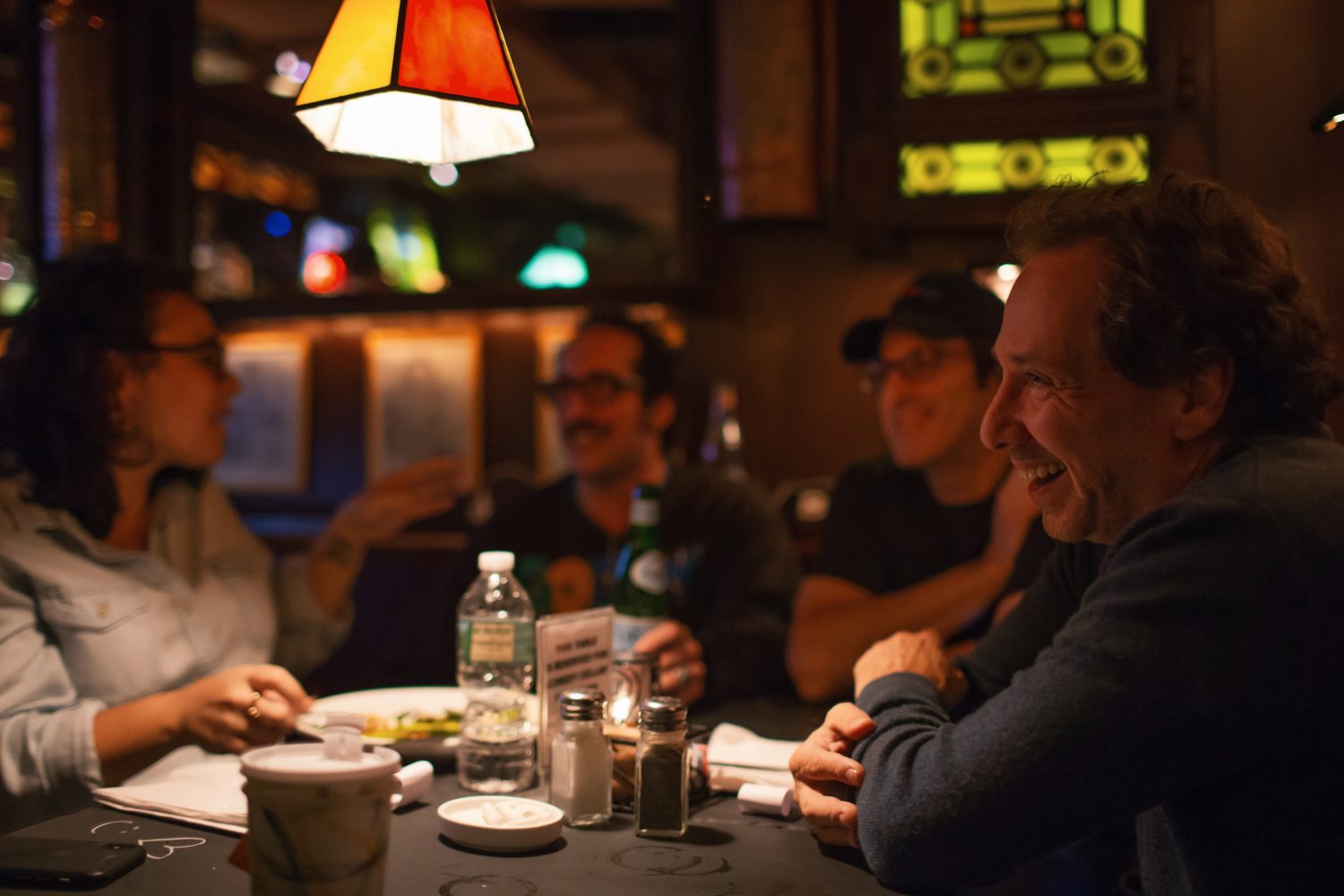
Tell us about “the table.”
ND: The comedians were always treated well in the Olive Tree, but they never had a particular table. And when it was busy, and in those days money was very tight, they had to get up and move if customers needed to sit down. One day Nick Di Paolo had enough of this, and he told my father that the comedians needed a table of their own, and my father agreed.
The table is the heartbeat of the Cellar. It was the inspiration for Colin Quinn’s “Tough Crowd” on Comedy Central. It’s a place where anybody can say anything they want and not be judged. Arguments and good-natured insults are a regular feature. It’s where comedians, including the most famous in the world, will come just to socialize even if they don’t feel like performing. Comedians really only like to hang out with other comedians. It’s where, when a tragedy happens, like when people have died, the entire community naturally assembles to commiserate and reminisce.
If the table didn’t exist, there’s no way we’d be as successful. A few years ago when we renovated our kitchen, the table was moved slightly by accident, and I got solemn emails from Louis CK and others—some of the most famous comedians in the world, worrying that things would never be the same. It was just a temporary thing, and in a week or two things were back to normal, but the level of anxiety it caused was really striking—and a clear indication of how important the institution of the table is. The New Yorker even did an article about the renovation and the table (very unfair and inaccurate by the way).
The table is the heartbeat of the Cellar. It was the inspiration for Colin Quinn’s “Tough Crowd” on Comedy Central. It’s a place where anybody can say anything they want and not be judged.
A good story or something that would start with “there was this one night… ?”
ND: When Donald Trump Jr. got hit over the head with a bottle and Trump Sr. threatened to sue us. I’ll send you the newspaper story.
We ran into Amy Schumer at your place, casually hanging out, when putting this feature together and she mentioned the importance of the family feel at the Cellar. What does that mean for you?
ND: Yeah, well we all spend more time at the Cellar than we do anywhere else. And also the comedians, as they come up, work together on the road and at clubs all over town. So the closeness that develops is very deep. Over time, especially because so many of the comedians don’t have families they go home to, this world becomes your family. I’m not entirely a part of that family. There’s always an element of “it’s my ball, so I get to play” that I’m aware of, so I don’t pretend to be one of them. But with many of them, I have a very close relationship.
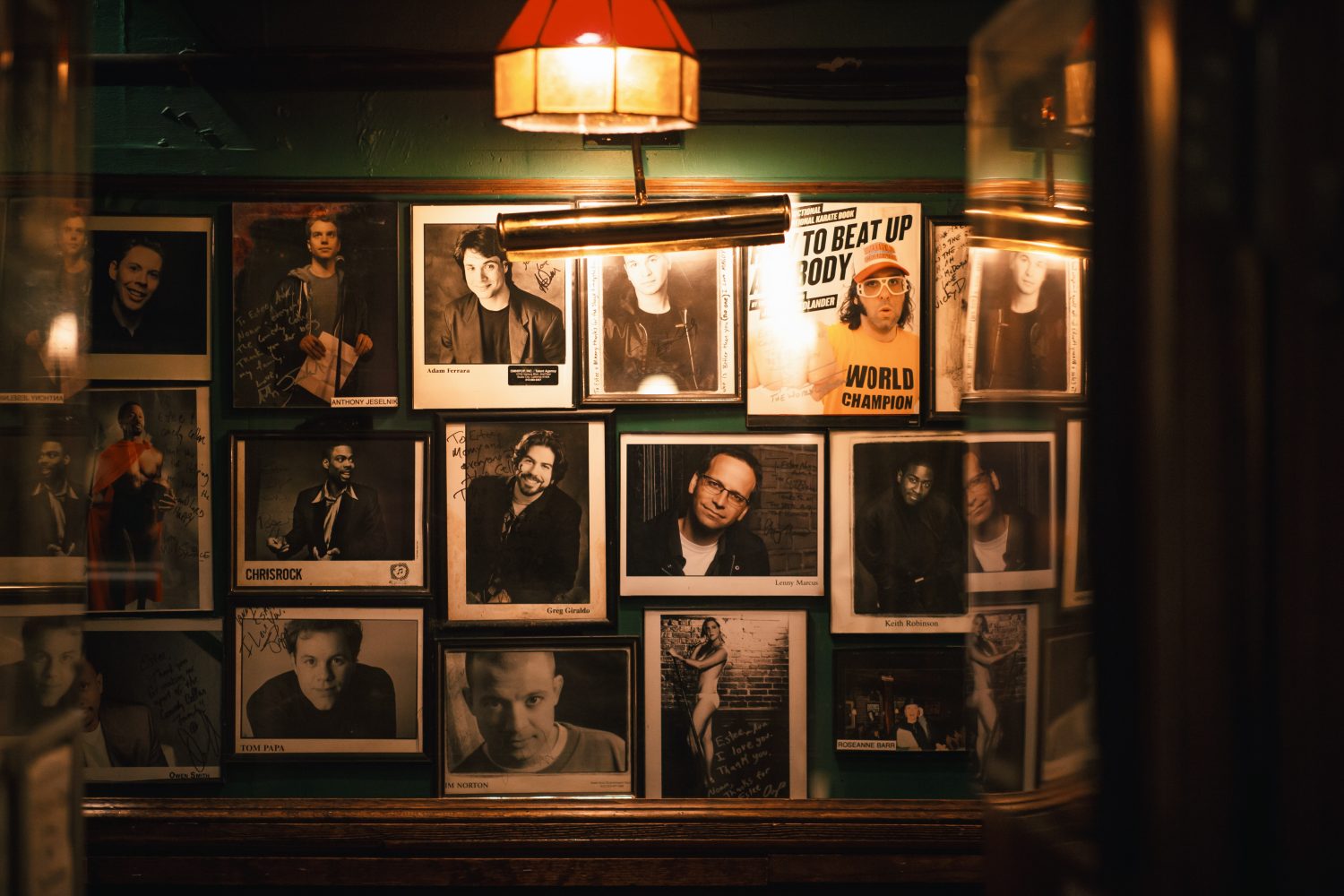
Funniest comedian of all-time?
ND: I can’t choose anyone living, so it would have to be Carlin or Pryor. But all the household names that have started at the Cellar have had nights where it was clear to me they were the best in the world. Also some of the mortals—like I saw Gary Gulman one night, and I remember thinking he’s as good as Carlin ever was.
But I will add that if you asked many of the comedians, Dave Attell is considered by many to be the most uniquely gifted, the most Mozart like, of the current generation. He’s the one people will go downstairs to watch every night and wonder “how does he do that?”
Strongest comedian who has ever played Comedy Cellar? Like physically strongest.
ND: I guess Joe Rogan is very tough, right? Not Gilbert Gottfried. But I wouldn’t want to fight Gottfried either.
Dave Attell is considered by many to be the most uniquely gifted, the most Mozart like, of the current generation. He’s the one people will go downstairs to watch every night and wonder “how does he do that?”
What are some similarities you have noticed between great musicians and comedians?
ND: I think about music all the time when I watch comedy. In a certain sense, so many arts are similar. A symphony needs a strong opening, just as great movie or book or a comedy set do. Think Beethoven’s 5th or any good Spielberg movie. Some comedians never recover from a tentative opening to their set.
Another thing I notice is the importance of spontaneity. When I was in the band, sometimes somebody would do something unplanned, and it would just set the room on fire. And then for the next ten shows, the performers would try the same thing, and it would never work. Comedians learn that lesson. Sometimes it’s just magic, and it can’t be recaptured. And all the cliches apply. Keep it simple. Less is more. Leave them wanting. The real geniuses and artists in comedy and music don’t compromise their artistic vision, but yet find a way to entertain the audience on their own terms. The hacks please the audience in ways that a million others have done it. But another group claiming to “never sell out” doesn’t concern themselves with pleasing the audience at all. I never understood that last group.
A perfect example is Colin Quinn’s one-man shows. Who would have thought that a show about world history or the American Constitution would pack theaters? Only Colin could pull it off. That’s real talent. He talks about what he wants to talk about, but he finds a way to bring the audience along. It’s like Jazz, it used to worry about entertaining a crowd, but at some point, it kind of stopped.
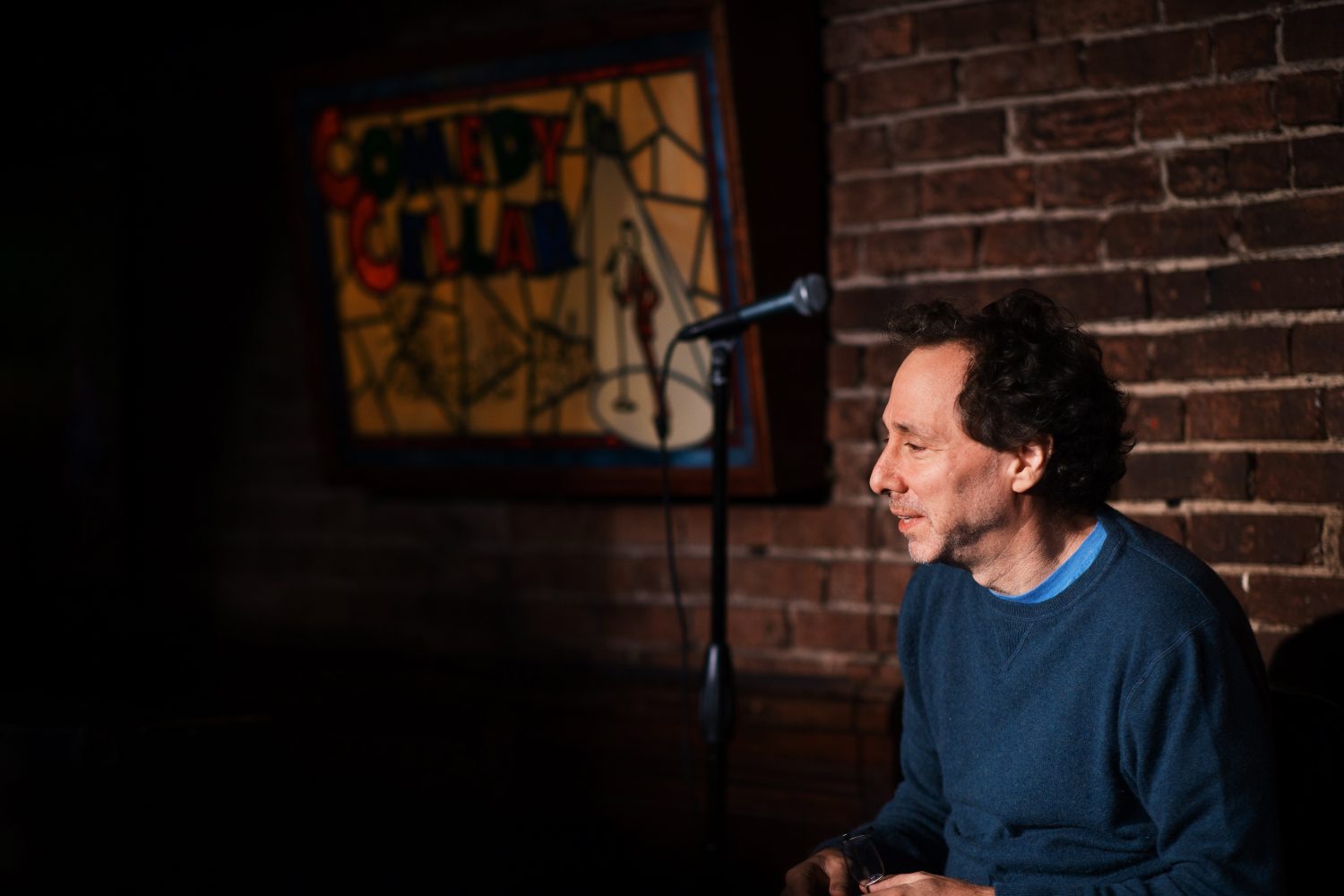
Biggest obstacle you’ve come up against running this business in New York?
ND: The City has become a very inhospitable place for business. It seems like every day they send out the inspectors to issue fines for new or never enforced rules and regulations that no one has ever heard of. The taxes, the hoops for making physical changes, the ridiculous increase in wages for tipped workers which left the untipped workers (who in almost all restaurants earn much less) behind. All of it is one big headwind to business. It’s no wonder that we see fewer and fewer mom and pop stores. Chains have tremendous economies of scale in everything from insurance to inventory, legal and accounting. They are experts in all the rules, regulations and compliance that a business has to manage. They have hundreds of thousands of dollars to invest that it takes to even think about legally opening a new place.
My father opened his first coffee house in 1960 using the money he made driving a cab. That world is dead. And contained in that death, I think we’ve seen a tremendous setback to the social mobility that we used to pride ourselves in. Yet, god bless so many immigrants, because they will work so hard that you still see an entrepreneurial spirit overcoming, but not like it used to, and at a tremendous cost of backbreaking hard work.
If we didn’t own our building, we would not still be around. And if you look at the businesses in the Village that have lasted, they are only landlord-operated or chains. That’s just terrible.
My father opened his first coffee house in 1960 using the money he made driving a cab. That world is dead. And contained in that death, I think we’ve seen a tremendous setback to the social mobility that we used to pride ourselves in.
Best places to buy tomatoes in New York?
ND: Ha, I don’t know about that stuff.
Top three comedy movies of all-time?
ND:
- City Lights—Charlie Chaplin
- What About Bob?
- Crimes and Misdemeanors (is that a comedy?)
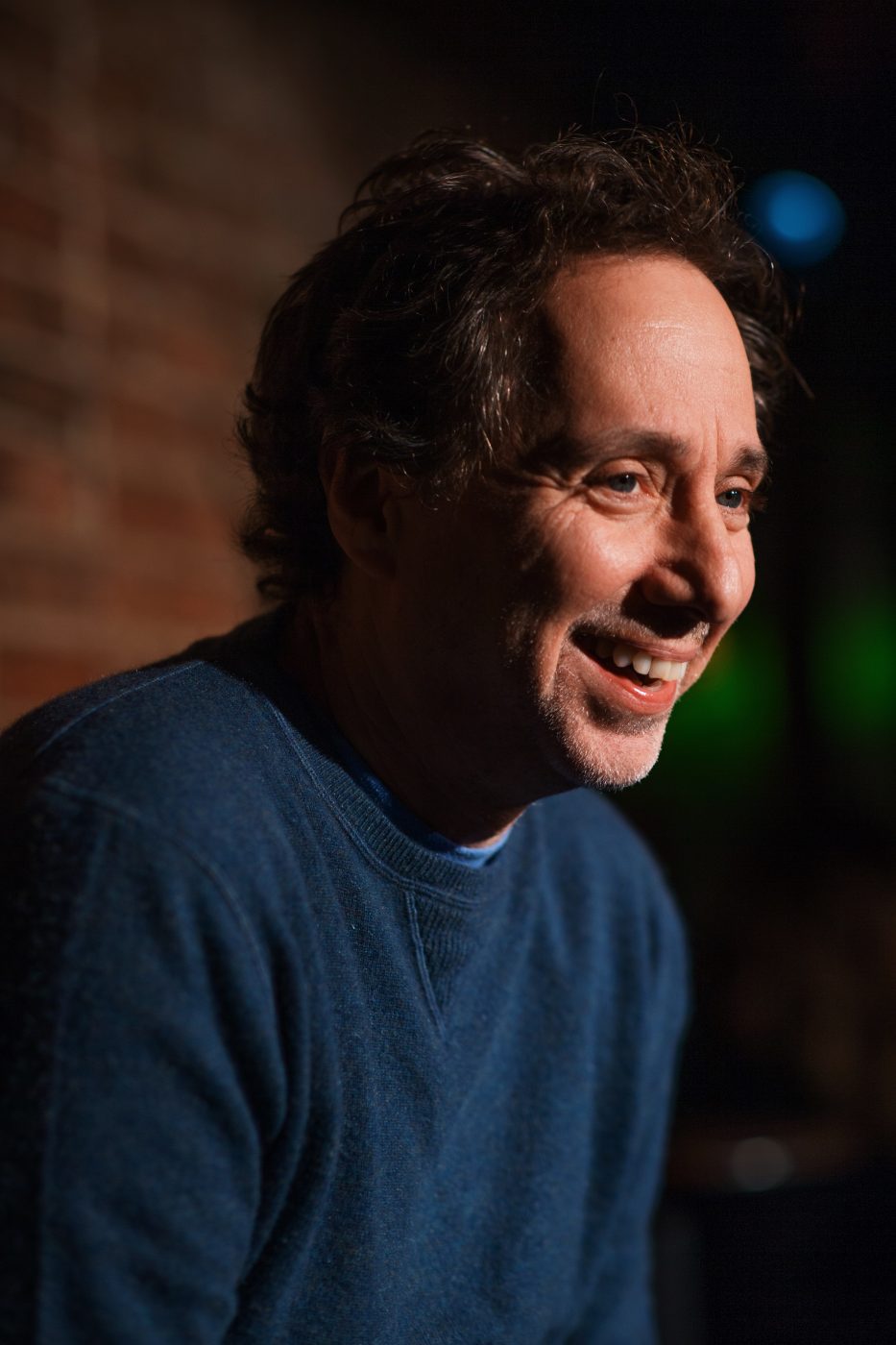
Three things someone should do when visiting NYC besides Comedy Cellar?
ND: There are the shows—like Book of Mormon—which are just fantastic. And the sights, like the Empire State Building, which are still compelling. And there’s always some amazing music or exhibit.
But the best fun is to be had by just spending a few nights staying up all night, and hitting random places at random times. Meeting people and having a NY adventure.
How do you want to be remembered 100 years from now?
ND: A good musician.

